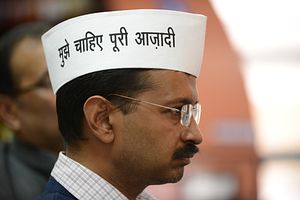Delhi’s new chief minister, Arvind Kejriwal, leader of the Common Man’s Party or Aam Aadmi Party (AAP), has been undergoing naturopathy in Bangalore for the past week, hoping to treat his chronic diabetes. But in his absence, just a month after winning the elections in Delhi by an overwhelming majority, deep fissures have emerged among the founding members of the party.
The bickering factions fall into two camps: Kejriwal and his trusted lieutenants, and senior leaders such as Yogendra Yadav, Shanti Bhushan, and his son, Prashant. Last week Yadav and the Bhushans were expelled from Political Affairs Committee (PAC), the highest decision making body of the party. The move has deepened tensions in the anti-corruption party, which came to power promising transparency and tolerance – to usher in a new kind of politics. The novelty seems to be wearing off.
But individual ambitions are derailing the nascent organization, risking the public’s trust and a trip back into the political dustbin. What issues divide the AAP?
If we’re to believe Kejriwal’s camp, Shanti and Prashant Bhushan tried to play spoil sport before elections in Delhi last month, discouraging officials from campaigning and undercutting fundraising efforts. The Bhushans allege that it was Kejriwal who erred – in the selection of candidates – giving opportunities candidates with dubious political backgrounds, compromising the principles of the AAP. Prashant Bhushan found fault with six party nominees who won seats in the assembly last month, leveling accusations of corruption against each of them.
Yadav, one of the most charismatic figures in the AAP and believed to be a key ideological figure in the rookie party, differs from Kejriwal on the topic of expansion. He wants the group to reach out to other parts of the country – taking advantage of the victory in Delhi. These differences are compounded by allegations within the party that Yadav planted anti-Kejriwal stories in the press last year, an effort to demoralize party leadership.
That crisis deepened on Wednesday after a sting operation, conducted last July, surfaced in the press. The sting uncovered an effort between AAP leaders and party officials to break up the Congress Party and form a government with defectors. At the time, the AAP was short of majority in the Assembly and was looking for support to form a coalition.
Those conversations are not unusual. What is damaging to the image of the party and Kejriwal, is that the revelations rip the veneer of anti-corruption from AAP, which used that mantle to capture the imagination of the people.
The infighting and the sting operation have had a very demoralizing impact on AAP affiliates all across India. A senior leader from Maharashtra, Anjali Damania, quit the party after learning of the sting operation.
“I didn’t sign up for this nonsense. I backed Kejriwal for his principles, not for horse-trading,” Damania tweeted.
Speculation that Yadav and the Bhushans could be thrown out of the party has sharpened the division between Kejriwal and his enemies.
That could create a mess for AAP. If Kejriwal the sole power figure in the party, it will embolden detractors that say the AAP is no different from mainstream parties such as the Bharatiya Janata Party (BJP) and Congress which give short shrift to the issues.
Yadav and Bhusans are well-respected and boast impeccable political credentials. Their exit would be the first split in the young party apparatus, making it vulnerable to attack from other parties, and ceding its high moral ground.
This spate of infighting does not bode well for the new party. With both the Congress party and BJP repositioning themselves to reclaim ground lost to AAP, the crisis in the nascent party exposes its ideological vulnerabilities and contradictions.
It also affects prospects for party expansion. People supported AAP because it offered hope of a wider democratic platform, giving ordinary Indians a political voice. But the events of the past week have exposed APP to an uncomfortable question: is it any different from the mainstream?

































